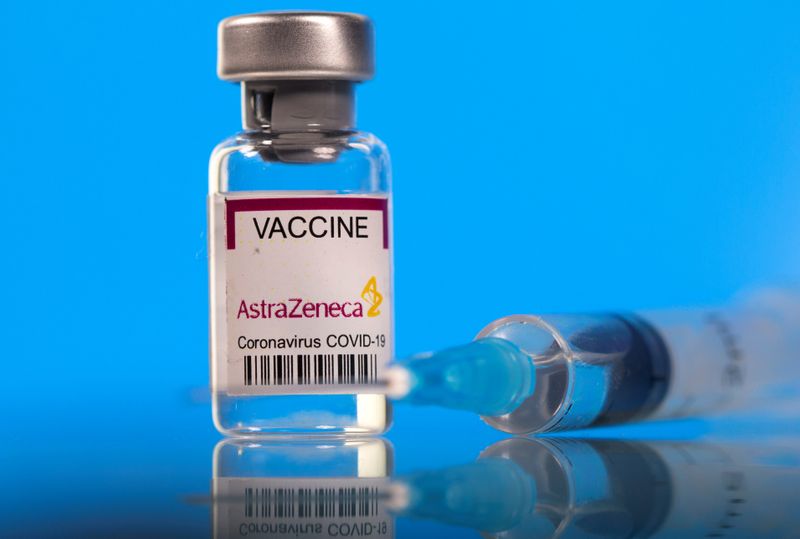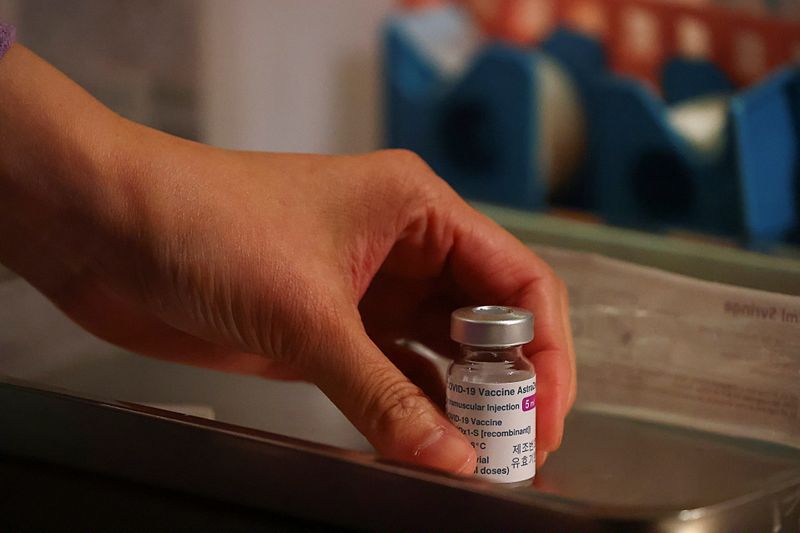By Ludwig Burger and Ben Blanchard
FRANKFURT/TAIPEI (Reuters) - AstraZeneca’s coronavirus vaccine received a major boost on Monday after data from a large trial showed it was safe and effective, potentially paving the way for its emergency authorisation in the United States as countries in Asia accelerated its rollout.
The trials in the United States, Chile and Peru showed the vaccine was 79% effective at preventing symptomatic COVID-19 and could bolster confidence in the product after confusion over its efficacy data, dosing regimen and possible side-effects.
Many European countries halted the use of the AstraZeneca (NASDAQ:AZN) shot earlier this month after some reports that it was linked to blood clots, but have since resumed inoculation after a regional regulator said it was safe. A survey on Monday showed Europeans remained sceptical over its safety.
Leaders in Asia have sought to boost public confidence by taking the AstraZeneca shot themselves amid concerns a slowdown in the global vaccination rollout could hurt the fight against COVID-19, which has killed over 2.8 million people worldwide.
The AstraZeneca shot was among the first and cheapest of the COVID-19 vaccines to be developed and launched at volume and is set to be the mainstay of vaccination programmes in much of the developing world.
"I have just finished getting the (AstraZeneca) injection, there is no pain at the injection site, and there is no soreness of the body," Taiwan Premier Su Tseng-chang told reporters as the island launched its inoculation campaign on Monday.
Thailand's prime minister also became the first person in the country to be inoculated with the AstraZeneca vaccine after its rollout was temporarily put on hold over safety concerns, while Indonesia began using it on Monday after suspending it last week. But Indonesia's Food and Drug agency has warned against its use on people with blood clotting disorders.
South Korean President Moon Jae-in, 68, plans to get the shot on Tuesday after the government said it could be used on older people.
Moon sought to reassure the public on Monday that the AstraZeneca shot is safe and encouraged people to take it.
"Vaccination is to protect not just yourself but also our society as a whole by creating herd immunity," he said.
British Prime Minister Boris Johnson received his first dose of the AstraZeneca COVID-19 vaccine on Friday, saying he "did not feel a thing."
HEADWINDS
The European Medicines Agency regulator said on Thursday the vaccine is effective and not linked with a rise in the overall risk of blood clots.
Yet a survey released on Monday showed that people in seven European countries were more likely to see the vaccine as unsafe than as safe.
Many Asian countries heavily rely on the AstraZeneca vaccine to end the pandemic, as the shot is being used in inoculation programmes in Australia, South Korea, the Philippines, Vietnam, Thailand, and India.
Some states in India, which has the highest coronavirus caseload after the United States and Brazil, are seeking to accelerate the vaccination drive, as the country reported its most COVID-19 cases and deaths in months on Monday.
As vaccine demand rises at home, top producer the Serum Institute of India has delayed further shipments of the AstraZeneca shot to the United Kingdom, Brazil, Saudi Arabia and Morocco..
Australia, which has inoculated just 1% of its population so far, is also accelerating vaccination after the country's pharmaceutical regulator approved on Sunday the local manufacturing of the AstraZeneca vaccine by CSL.

Within 12 weeks, CSL is expected to produce 1 million doses of the vaccine each week.
